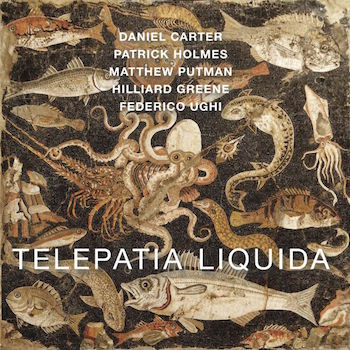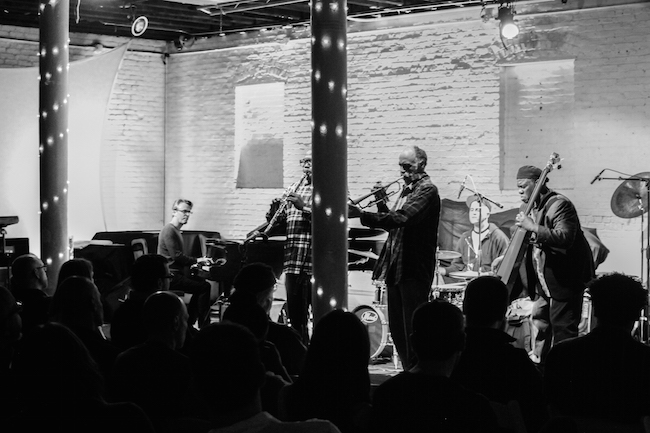Jazz CD Review: Daniel Carter’s “Telepatia Liquida” — Mission Accomplished
Daniel Carter’s disc revolves, splendidly, around a process of self-discovery.
Telepatia Liquida, Daniel Carter. 577 Records.

Telepatia Liquida is a recording of a live set of free jazz that, as the announcer tells us, kicked off the last night of Brooklyn’s Forward Festival 2017. It features the quintet of the 72 year old saxophonist (and occasional cornetist) Daniel Carter, who in his long musical history has played with avant-gardists Sun Ra and Cecil Taylor along with outliers such as Yoko Ono and Jaco Pastorius. Carter has been in Boston recently: he appeared with Matthew Shipp and William Parker on the 2017 album, Seraphic Light, recorded at Tufts (a disc reviewed by The Arts Fuse). He has also played repeatedly with several of the musicians in the new quintet found on Telepatia Liquida: pianist Matthew Putman and drummer Federico Ughi. He recorded at least once with bassist Hilliard Greene, so the newcomer is clarinetist Patrick Holmes.
Given the mission of the festival, this set was meant to be an adventure. The group has played together before (Telepathic Alliances), and they come from radically different backgrounds. Ughi is from Rome; clarinetist Patrick Holmes comes from Texas; an Ohio-ian, Putman is a scientist as well as pianist. This exercise in telepathy is inspired by their distinct musical experiences and open ears — not on common experiences outside of music. There are three numbers here: “Deluxe Light” goes directly (by way of a drum solo) into “Shine-a-town,” which ends with the pleased laughter of the bandmembers. The final piece is “Throne.”
“Deluxe Light” begins with the drums, a bass drum stroke, and non-committal sounds on cymbals and tom toms. Then comes a pause. Bassist Greene enters with a bent note and then a suggestive, almost bluesy, phrase that he repeats at different pitches. He’s answered by pianist Putman while the horns play in the background. It’s a bit chaotic but, thanks to the rhythm section, it begins to swing a few minutes later. The bass contributes repeated rapid notes, changing pitch irregularly while the drummer plays an insistently rapid four behind the horns. (Carter is on cornet.) The band is fearless, of course, and not averse to playing something like ‘avant-swing.’ This section changes when the clarinetist asserts himself with a more obviously swinging phrase, to which the band bends immediately.

Daniel Carter and band in action at the Forward Festival. Photo: Forward Festival and 577 Records.
As if to acknowledge that it is Holmes’ moment, the band hushes at this point in “Deluxe Light.” Carter drops out and the clarinetist solos over the bass with a few single notes by the pianist. Then Carter enters at the same hushed volume. There’s a sudden hush six minutes in, with clarinetist Holmes jumping in to perform what is essentially a peaceful solo that, paradoxically, ends in an angry growl. His final sighs introduce Carter. Meanwhile, the other players offer suggestive phrases in the background. The band is ready to subside so that one member can stand out, or flood in behind whoever takes the spotlight. There’s never a sense of hurry, or excessive business, even in the busiest parts of the quintet’s group improvisations. The piece revolves around a process of self-discovery.
It’s this dedication to moments of sensitive and logical change, spontaneous shifts in texture and role, that distinguish Telepatia Liquida. On “Shine-a-Town” we hear Carter on tenor playing hard with some of the squeals and growls we have come to expect (since John Coltrane) from avant-garde saxophonists, but then after a minute or so he brings this section to an end by some held notes that seem to signal a new moment to the other musicians, triggering an extended descrescendo. On “Throne,” there’s a long duet between clarinet and tenor saxophone which is gradually (and subtly) intruded upon by the intoning of a bass drum, bowed bass, and harmonically indecisive chords on the piano. The sound seems to expand naturally: it’s as if someone threw open a window for a second. This sudden group statement stands as the climax of the set.
Michael Ullman studied classical clarinet and was educated at Harvard, the University of Chicago, and the U. of Michigan, from which he received a PhD in English. The author or co-author of two books on jazz, he has written on jazz and classical music for The Atlantic Monthly, The New Republic, High Fidelity, Stereophile, The Boston Phoenix, The Boston Globe, and other venues. His articles on Dickens, Joyce, Kipling, and others have appeared in academic journals. For over 20 years, he has written a bi-monthly jazz column for Fanfare Magazine, for which he also reviews classical music. At Tufts University, he teaches mostly modernist writers in the English Department and jazz and blues history in the Music Department. (He plays piano badly.)
